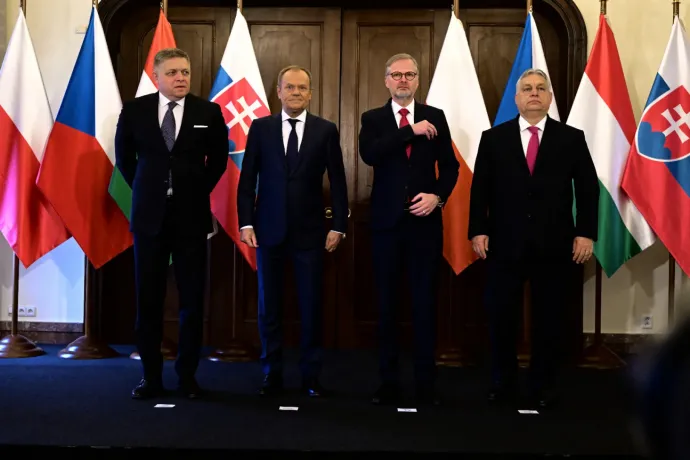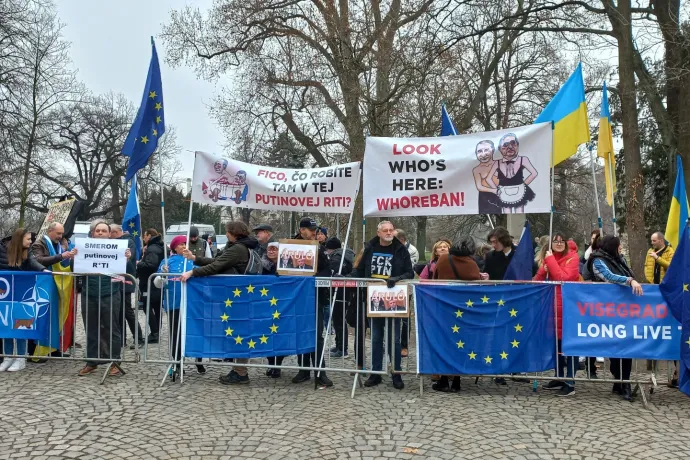Hungary's most important national security concern is not to share a border with Russia – Orbán at V4 summit

Although Tuesday's meeting of the Visegrád Four was held in a tense atmosphere due to differences over the war in Ukraine, this is not what the prime ministers emphasised after the talks had concluded, but instead, they all spoke about strengthening the V4 and focusing on common issues.
Orbán: It's worth continuing the V4
Viktor Orbán pointed out that this was the 52nd meeting of the Visegrád Four that he had attended as prime minister, and it was one of the most difficult ones. He also noted that at the same time, he had participated in a very rare and intellectually and politically stimulating debate.
Orbán said that today's was a meeting of introspection, because as the world changes, the question of whether the V4 is needed at all has to be asked. He explained that there were many common interests in the Brussels structure that made them work together in the past, but the war between Russia and Ukraine has overruled everything. He said that he wanted to know whether – despite their obvious differences of opinion – they could work together on lower level issues.
According to the Hungarian Prime Minister there was agreement among the four countries that Russia's aggression was a gross violation of international law and that Ukraine should be helped. Orbán said
it is in Hungary's interest, and it is the country's most important national security concern, not to share a border with Russia, because we have bad memories of that.
The Hungarian Prime Minister concluded by saying that it was worth continuing the V4, because there were four issues on which they would already be worse off if they weren't cooperating. Those four issues are illegal migration, bringing the Ukrainian economy closer, tackling tax harmonisation in Brussels and nuclear energy, because without it there is no green future.
When answering journalists' questions, Orbán repeatedly returned to the subject of the war. He spoke of a strategic calm and said that through the Hungarian lens it was clear that neither Russia nor the West-backed Ukraine could win the war. He said that a war can only be ended by peace talks, and since there was no winner in sight, peace talks should be held as soon as possible, because that would save more lives. According to Orbán's logic, there should be no talk of war criminals until the war is over.
Tusk: We used to have similar dreams, and they have remained unchanged
Polish Prime Minister Donald Tusk also spoke about a genuine exchange of ideas and recalled the founding of the V4, saying that the Visegrád Group has very strong foundations, such as the Hungarian Revolution of 1956 and the Polish Solidarity movement. He asked everyone to remember these fundamental values.
"Viktor Orbán knows very well that his first famous appearance, which was about the expulsion of the Red Army from Hungary, is deeply rooted in memory.
We used to have similar dreams, and they have fundamentally remained unchanged. Our peoples are closely linked, the friendship is still there, but our interests must be aligned," Tusk said.
The Polish Prime Minister called reviewing the Common Agricultural Policy a strategic task, and said he would also like to place the free trade agreement with Ukraine on a new footing, as it is also threatening their economy.
Tusk said that the situation of the V4 had become more complicated, but that they should work to ensure that at least some of the issues were on their shared agenda.
Fiala: It makes sense to work together
Czech Prime Minister Petr Fiala also emphasised that it makes sense for the four countries to work together, despite their disagreement on Ukraine. He also mentioned energy, migration and agricultural policy as common issues, and underlined that all four countries believe that the EU's founding Treaties should not be changed.
Fico: One of the most important V4 summits
Slovakia's Robert Fico started by saying that he had previously been to a V4 meeting where he felt like yawning because it was about boring, technical issues, but today the Slovak prime minister wasn't tempted to yawn, as it was one of the most important V4 summits for him. He said that it might seem like the relationship between the V4 has been weakened due to the different perceptions on the subject of Ukraine, but this was not the case. He added that the focus should instead be on what will happen once the war is over, and what role the Visegrád Four can play in regional policy.
A Slovak TV journalist asked Fico whether he was afraid of becoming as isolated within Europe as Hungary, and the Hungarian Prime Minsiter felt the question was partly addressed to him as well. Orbán therefore said that just because Fidesz isn't a member of any of the big European parties, Hungary is not isolated, because it is still involved in the work of the European Council and NATO. "One should not be afraid to be alone with one's opinion," he said.
Given the existing fault lines, the prime ministers were also asked whether there is actually a V4 or whether we should be talking about V2+2 instead. Fiala said it would be a gross oversimplification to talk about 2+2 countries, but they have never made a secret of the fact that there are differences of opinion. He said that the configuration does change from time to time, and sometimes one might as well be talking about V3+1 and V4+0.
It was not expected to be a meeting of friends
The Prague summit was one of the most tense summits in V4 history. Based on a January statement by the Czech Prime Minister, one of the preconditions for the meeting was Hungary's support for financial aid to Ukraine at the EU summit in early February, and Hungary's ratification of Sweden's membership of NATO, which Parliament finally approved on Monday.
In and of itself, however, this didn't make the tension among the four countries disappear in Prague, where it was instead expected that the Czech and Polish prime ministers would approach Orbán and Fico with reservations.
"I can't say that meeting with colleagues with whom I actually disagree on a number of key issues is the greatest pleasure for me. And here, I am thinking of the Hungarian and Slovakian prime ministers. But we have to have a dialogue nevertheless, somebody has to do it,"
Czech Prime Minister Petr Fiala, who hosted the meeting, said on Monday. In an unusual move in diplomacy, Fiala also held separate talks with Poland's Donald Tusk.
At their separate, bilateral meeting ahead of the V4 summit on Tuesday, Fiala and Polish Prime Minister Donald Tusk of course discussed the Hungarian and Slovak sides' disagreement with military support for Ukraine. Following the bilateral meeting, Tusk said that he wanted to remind Fico and Orbán that the V4 was founded on the basis of their independent states joining the West, which is why they have all become members of NATO and the European Union and can therefore help Ukraine. Before the summit, Tusk said that the talks would reveal whether there was still a point to the Visegrád Four at all.
After the bilateral meeting, the Czech Republic and Poland both said they would step up their support for Ukraine, but would not be sending troops.
As the leaders arrived, several dozen demonstrators greeted Viktor Orbán and Robert Fico, two of the Visegrád Four prime ministers considered pro-Russian, with booing and jeering outside the Liechtenstein Palace in Prague. Responding to our reporter's questions as he arrived, the Hungarian Prime Minister said that the mood was cheerful, and although there are always tensions, they should be handled cheerfully.

The wind has turned in Warsaw and Bratislava
Beyond NATO enlargement and support for Ukraine, the relationships of the V4 have also been strained by differences over attitudes towards the EU. However, this has changed following the defeat of Law and Justice (PiS) – which shares Orbán's ideological platform – in Poland in last autumn's elections, bringing Donald Tusk back to power at the helm of a broader coalition. Warsaw is well on the way to settling its relations with Brussels, which will give it access to substantial EU funds that have been cut off from it over rule of law concerns in the same way as they have been cut off from Hungary due to the policies of the Hungarian government.
In Slovakia, on the other hand, the change was partly reversed in the autumn, when Robert Fico's party won the elections again, allowing him to return to the premiership for a third time after more than five years. Fico is as opposed to Western armed support for Ukraine as Orbán, so the Hungarian Prime Minister may have found an ally in the V4 at least on this issue.
For more quick, accurate and impartial news from and about Hungary, subscribe to the Telex English newsletter!